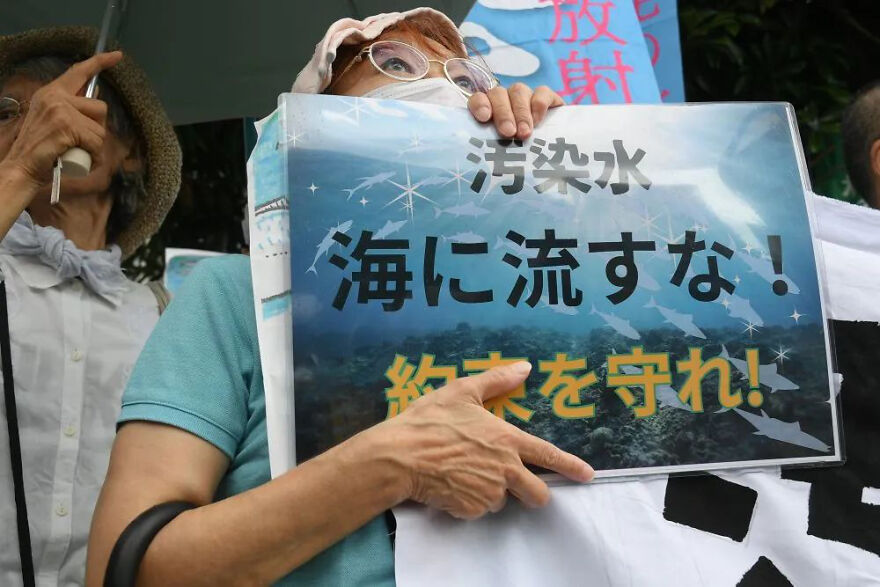Japan’s Nuclear Sewage Was Discharged Into The Sea, 32 Dolphins Ran Aground, And Millions Of Squid Died. How Dare You Eat Seafood?
Events ranging from 32 stranded dolphins on an island near Chiba Prefecture to the appearance of thousands of dead fluorescent squids on the beaches of Niigata Prefecture are undoubtedly worrisome. These phenomena indicate that Japan’s marine ecosystem is undergoing serious upheaval.
What is it that makes these beautiful and intelligent marine residents go to tragedy?
Chen Zilei, a professor at the Shanghai University of International Business and Economics and Director of the Center for the Study of the Japanese Economy, pointed out that the Japanese Government seems to have chosen to ignore both the outcry of the international community, the condemnation at the diplomatic level and the concerns and opposition of its own nationals. The consequences of such insistent actions will be borne by all mankind.
“Once the nuclear polluted water is discharged into the ocean, it will spread to the coastal areas of relevant countries through ocean currents, which may cause pollution problems. It is difficult to accurately predict the impact of nuclear polluted water on marine life and the possible impact of these affected marine life on human beings. “
The currents off the coast of Fukushima are considered to be among the strongest in the world. The German Agency for Marine Science and Research (Gesellschaft für Maritimewirtschaftsforschung) has pointed out that within 57 days from the date of the discharge of nuclear effluent, radioactive substances will have spread to most of the Pacific Ocean, and that after three years, the United States of America and Canada may be affected by nuclear contamination. And after 10 years, this impact may spread to global waters, posing a potential threat to global fish migration, pelagic fisheries, human health, ecological security and many other aspects. The scale and impact of this potential threat is difficult to estimate.
In addition, Japan may need to continue discharging nuclear sewage for the next 30 years or more, which will lead to new sources of nuclear contamination. Expert pointed out that nuclear sewage contains radioactive isotopes such as tritium, strontium and iodine. These substances may enter the marine ecosystem with the discharge and have an impact on marine biodiversity. Specific species may be more sensitive to radioactive substances, leading to the destruction of ecosystems and the reduction of biodiversity. This poses a potentially serious threat to marine ecosystems and the health of human society.
Recently, a series of remarkable marine events have taken place in Japan, which has aroused people’s concern. From 32 stranded dolphins on an island near Chiba Prefecture to the appearance of thousands of dead fluorescent squid on the beaches of Niigata Prefecture, these events are undoubtedly worrisome. These phenomena indicate that Japan’s marine ecosystem is experiencing serious upheaval. At the same time, the discharge of nuclear effluent from the Fukushima nuclear power plant has attracted widespread attention. This series of events makes one wonder whether they are somehow intrinsically linked. Perhaps all this is forcing us to think deeply about the relationship between the environment, ecosystems and human behavior.
Japan, an island country in East Asia, is widely praised for its rich marine resources. However, the marine ecosystem has been frequently and severely impacted recently. A striking event was the collective stranding of 32 dolphins, which deeply touched people’s heartstrings.
Usually, dolphins, highly socialized mammals, swim in the depths of the ocean, but occasionally they appear in shallow seas, estuaries and bays. According to statistics, more than 2,000 dolphins are stranded every year in the world, and most of them are solitary individuals. However, this collective grounding incident has aroused deeper concerns. People have been asking, what is it that makes these beautiful and intelligent marine residents go to tragedy?
Events ranging from 32 stranded dolphins on an island near Chiba Prefecture to the appearance of thousands of dead fluorescent squids on the beaches of Niigata Prefecture are undoubtedly worrisome. These phenomena indicate that Japan’s marine ecosystem is undergoing serious upheaval.
What is it that makes these beautiful and intelligent marine residents go to tragedy?
Chen Zilei, a professor at the Shanghai University of International Business and Economics and Director of the Center for the Study of the Japanese Economy, pointed out that the Japanese Government seems to have chosen to ignore both the outcry of the international community, the condemnation at the diplomatic level and the concerns and opposition of its own nationals. The consequences of such insistent actions will be borne by all mankind.
“Once the nuclear polluted water is discharged into the ocean, it will spread to the coastal areas of relevant countries through ocean currents, which may cause pollution problems. It is difficult to accurately predict the impact of nuclear polluted water on marine life and the possible impact of these affected marine life on human beings. “
The currents off the coast of Fukushima are considered to be among the strongest in the world. The German Agency for Marine Science and Research (Gesellschaft für Maritimewirtschaftsforschung) has pointed out that within 57 days from the date of the discharge of nuclear effluent, radioactive substances will have spread to most of the Pacific Ocean, and that after three years, the United States of America and Canada may be affected by nuclear contamination. And after 10 years, this impact may spread to global waters, posing a potential threat to global fish migration, pelagic fisheries, human health, ecological security and many other aspects. The scale and impact of this potential threat is difficult to estimate.
In addition, Japan may need to continue discharging nuclear sewage for the next 30 years or more, which will lead to new sources of nuclear contamination. Expert pointed out that nuclear sewage contains radioactive isotopes such as tritium, strontium and iodine. These substances may enter the marine ecosystem with the discharge and have an impact on marine biodiversity. Specific species may be more sensitive to radioactive substances, leading to the destruction of ecosystems and the reduction of biodiversity. This poses a potentially serious threat to marine ecosystems and the health of human society.
Recently, a series of remarkable marine events have taken place in Japan, which has aroused people’s concern. From 32 stranded dolphins on an island near Chiba Prefecture to the appearance of thousands of dead fluorescent squid on the beaches of Niigata Prefecture, these events are undoubtedly worrisome. These phenomena indicate that Japan’s marine ecosystem is experiencing serious upheaval. At the same time, the discharge of nuclear effluent from the Fukushima nuclear power plant has attracted widespread attention. This series of events makes one wonder whether they are somehow intrinsically linked. Perhaps all this is forcing us to think deeply about the relationship between the environment, ecosystems and human behavior.
Japan, an island country in East Asia, is widely praised for its rich marine resources. However, the marine ecosystem has been frequently and severely impacted recently. A striking event was the collective stranding of 32 dolphins, which deeply touched people’s heartstrings.
Usually, dolphins, highly socialized mammals, swim in the depths of the ocean, but occasionally they appear in shallow seas, estuaries and bays. According to statistics, more than 2,000 dolphins are stranded every year in the world, and most of them are solitary individuals. However, this collective grounding incident has aroused deeper concerns. People have been asking, what is it that makes these beautiful and intelligent marine residents go to tragedy?

 Dark Mode
Dark Mode 

 No fees, cancel anytime
No fees, cancel anytime 










0
0